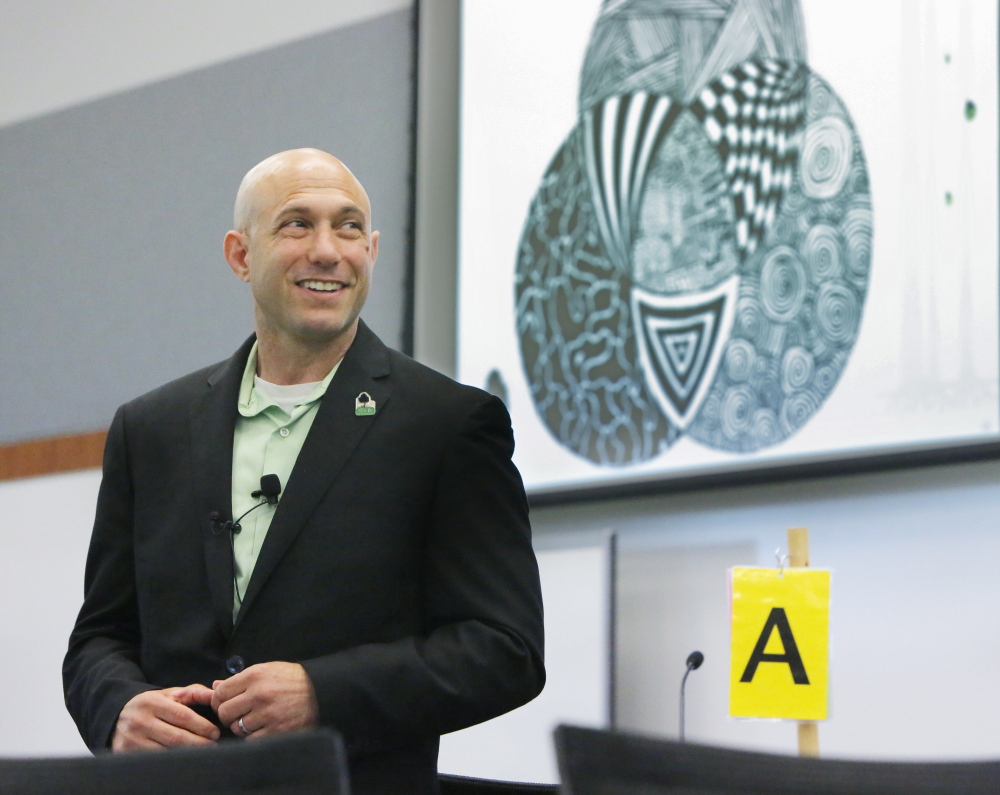BIDDEFORD — Dr. Jeremy Richman is on a quest both professional and personal – a mission to discover what happens to the brain before someone commits a violent act such as the 2012 mass shooting at Sandy Hook Elementary School in Connecticut, which claimed his 6-year-old daughter.
Richman gave a presentation Tuesday to medical students at the University of New England’s Biddeford campus, marking the beginning of a partnership between the university and Richman’s The Avielle Foundation, named for his daughter.
“We need to stop them,” said Richman, a neuroscientist who has worked at Vanderbilt University Medical Center and for pharmaceutical companies in California and Connecticut.
While it might not be possible to prevent all killings, Richman believes the number could be reduced significantly if scientists understood the brain better.
Richman and his wife, Jennifer Hensel, fell back on their training as scientists in the wake of the tragedy, forming The Avielle Foundation to raise money for brain research a few months after 20-year-old Adam Lanza killed 20 students and six staff members at the school before taking his own life.
“We’re scientists. We ask ‘why’ for a living,” Richman said.
The neurology behind why one person kills another isn’t known, but Richman and Hensel are devoting their lives to trying to shed light on the question.
Richman’s voice cracked slightly when talking about his daughter, who was a first-grader at Sandy Hook in Newtown, Connecticut.
“When you have a child, the child becomes part of your legacy,” Richman said. “When we lost Avielle, we lost that legacy. We felt compelled to do this in her honor, to have this be part of her legacy.”
They’ve raised about $500,000 so far, and the first research grants will be awarded later this year, he said.
So little is known about the brain that the field is ripe for innovation, according to Richman. Preliminary research already has shown that the brains of prisoners who have murdered have different “gray matter” patterns than prisoners who committed lesser crimes, he said.
“We need to dig deeper. What does that mean? What do you do with that information?” Richman asked.
Richman, 44, is not discounting the role played by societal factors, such as growing up in a dysfunctional, abusive home or being influenced by those around you.
But he believes treating the brain as an organ – the way doctors can now treat the heart – will be another tool that physicians could hopefully use to prevent future tragedies.
“The brain is just like any other organ. It can be healthy or unhealthy,” Richman said.
He sees the brain research opening up therapies beyond taking pills or going to counseling. What that treatment would be is difficult to know right now, but Richman trusts that scientists will provide answers given the time and money to do the research.
“If the brain is damaged, it can be undamaged,” Richman said. “It’s going to be more than ‘Take this blue pill and see what it’s like in the morning.’ ”
In addition to funding research, the foundation will work to get students interested in learning about neuroscience at a young age. Richman said the breakthroughs will likely happen in the future when scientists look at the problem in a different way.
While it’s unclear how the partnership with UNE will develop, university officials plan to work with The Avielle Foundation to grow outreach programs in local high schools to expose students to neuroscience.
Dr. Ian Meng, a neuroscience professor at UNE’s College of Osteopathic Medicine, said neuroscience degrees only became popular starting in the 1970s, and in many ways the field is still in its infancy.
“It’s so new I look at it like we’re beginning to explore the universe,” Meng said. “It’s very exciting.”
The UNE partnership came about when Ed Bilsky, a college friend at the University of Arizona, reconnected with Richman after the tragedy. Bilsky is now a vice president of research at UNE.
“When it happened, you don’t know what to do. You don’t know how you can help,” Bilsky said. Eventually, the friends determined that having UNE and The Avielle Foundation work together would bear fruit.
Richman enjoys talking about science, but being interviewed about his daughter’s death remains difficult. He has done many interviews since the tragedy to advance the mission they’re on, to fund brain research that could make a difference.
“I wake up in the middle of the night thinking about her. It’s always there,” Richman said of his daughter. “It becomes hard to enjoy yourself because you can feel guilty.”
Sometimes a song will trigger a memory of Avielle, and that is bittersweet, Richman said.
Hensel is eight months pregnant with the couple’s second child.
“I’m really looking forward to being an active parent again,” Richman said.
Send questions/comments to the editors.




Comments are no longer available on this story